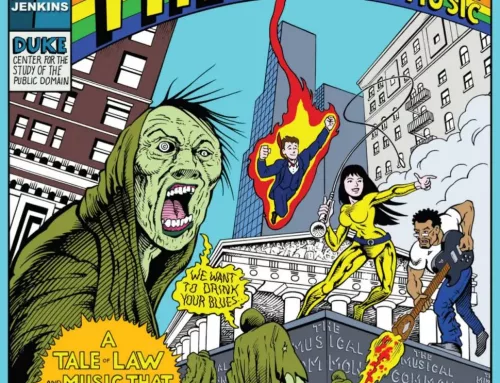The “music / art industry” left behind?
I had an interesting chat with my friend Mark yesterday. He works for Universal in Germany, and we shared our perspective on the creative arts industry in the context of the covid19 situation.
One thing that struck me during our conversation was how I kept joking that the “music industry” (the creative arts industry) is not really an industry. It some aspects of an industry, but it also differs significantly from other industries. For example, look at how the “music industry” is treated compared to the car or the aviation industry. I think we call it “music industry” because we want to be taken seriously as a professional community. But sadly, I don’t think we are. We are mostly individuals who care about our own interests and try to maximize our benefits whenever and wherever we can. Unlike e.g. the car industry, where they stand united and fight back against any threats to their interests, the “music industry” is fragmented and weak. Just mention the word “royalties” and you will see how people roll their eyes.
One of the challenges that the “music industry” (and other creative or artistic industries) faces is the lack of recognition and appreciation from society in most countries. Many people do not see music (or creativity or art) as a valuable or essential part of human life, but rather as a luxury or a hobby that can be easily dismissed or ignored. This attitude affects the funding, support, and opportunities that musicians (and other artists) receive and undermines their self-esteem and motivation.
Another challenge that the “music industry” (and other creative or artistic industries) encounters is the difficulty of explaining and justifying the purpose and meaning of music (or creativity or art). Why do we need music? What does it do for us? How does it relate to our culture and identity? These are not easy questions to answer, and different people may have different opinions or perspectives. Some may argue that music is a form of expression, communication, entertainment, education, therapy, or spirituality. Others may claim that music is a waste of time, money, or talent.
I personally think that music, creativity, and art are essential aspects of human existence that define, represent, and create our culture. They are not only products of our culture, but also sources of inspiration and innovation for our culture. They help us to explore, understand and celebrate our diversity and commonality as human beings. They also help us to cope with the challenges and uncertainties of our world. As Morse Peckham said, art is the exposure to the tensions and problems of a false world in order that man may endure the tensions and problems of the actual world.
Music and art are not driven by reason, but by wonder and surrender. They invite us to experience something beyond our rationality and logic. They allow us to feel, imagine and create without limitations or expectations. They give us a break from reasoning and a chance to connect with ourselves and others on a deeper level. I would even say that music and art are the reason why societies have not gone completely insane. They provide us with hope, joy, beauty, and harmony in a chaotic and complex world.
So, is “music & the arts” a bit of a luxury? Something you might do after the proper job?
Music and the arts are often seen as a bit of a luxury, something that people enjoy after they finish their proper job. However, this view ignores the significant contribution that music and the arts make to the economy, society, and culture. According to a recent industry report in 2021 (Economic Impact of the Arts and Cultural Sector), music and the arts generated over $919 billion in revenue and employed more than 5.2 million people in the US alone. Music and the arts are not only a source of income and employment, but also a way of expressing creativity, identity, and diversity. They enrich our lives with beauty, meaning and inspiration.
However, many states do not recognize the value of music and the arts, and treat them as a luxurious commodity of society, but not a necessity. They cut funding for arts education, cultural institutions, and public programs. They impose regulations and taxes that make it harder for artists and musicians to create and distribute their work. They fail to protect the intellectual property rights and fair compensation of the creators. They neglect the needs and interests of the music and arts community.
People can have the misconception that art is passion and not work. They think that artists and musicians do what they love for fun. They do not understand the amount of skill, effort and investment that goes into producing music and art. They do not appreciate the challenges and risks that artists and musicians face in a competitive and uncertain market. They do not realize that art is work, and work is art.
As long as there is wealth, art activity is happening. With decreasing wealth, art activity decreases too. Question, “is art essential to survive”?
This is a question that has been debated for centuries by philosophers, artists, and scientists. Some might argue that music and art are merely forms of entertainment or expression that have no direct impact on our survival. Others might contend that music and art are vital aspects of human culture and well-being that enrich our lives and help us cope with challenges.
One possible way to approach this question is to consider the evolutionary origins and functions of music and art. According to some theories, music and art emerged as adaptive behaviours that enhanced social cohesion, communication, and cooperation among early humans. Music and art may have also served as signals of fitness, intelligence, and creativity that increased one’s chances of finding mates and allies. Furthermore, music and art may have provided cognitive benefits such as memory, attention, and problem-solving skills that helped humans survive in complex environments.
Another possible way to approach this question is to examine the psychological and physiological effects of music and art on modern humans. Numerous studies have shown that music and art can influence our mood, emotions, motivation, and stress levels. Music and art can also stimulate our brain regions involved in reward, pleasure, empathy, and social bonding. Additionally, music and art can modulate our immune system, hormone levels, heart rate, blood pressure, and pain perception. These effects suggest that music and art can enhance our physical and mental health and resilience.
Therefore, based on these perspectives, one might conclude that music and art are essential to survive in some sense. Music and art may not be necessary for our basic biological survival, but they may be crucial for our social, emotional, cognitive, and cultural survival. Music and art may not only reflect our humanity but also shape it.
The relationship between wealth and art activity is complex and dynamic. On one hand, wealth can enable and stimulate art activity by providing resources, patronage, and markets for artistic expression. On the other hand, art activity can also create and distribute wealth by generating value, innovation, and cultural capital.
In a world where life is dominated by work and productivity, art activity may seem irrelevant or dispensable for many people. However, this view neglects the vital role that art activity plays in enhancing our wellbeing. Art activity can enrich our lives by offering us beauty, joy, meaning, and connection. Art activity can also challenge us to think critically, creatively, and ethically about ourselves and our society. Art activity can also empower us to express ourselves and to participate in our culture and democracy. Therefore, one could argue that art activity is not only essential for survival, but also for flourishing.
Music and the arts are essential for our wellbeing and survival. They provide us with joy, comfort, and relief from stress. They stimulate our imagination, curiosity, and learning. They foster social connection, communication, and collaboration. They promote diversity, tolerance, and democracy. They challenge us to think critically, creatively, and ethically. They help us cope with change, adversity, and uncertainty.
So, is “music & the arts” a bit of a luxury? Something you might do after the proper job?
To ask if “music & the arts” is a bit of a luxury is to underestimate the profound impact that these forms of expression have on human development, well-being, and society. Music and the arts are not just hobbies or pastimes that one might do after the proper job. They are essential components of a well-rounded education and a fulfilling life.



